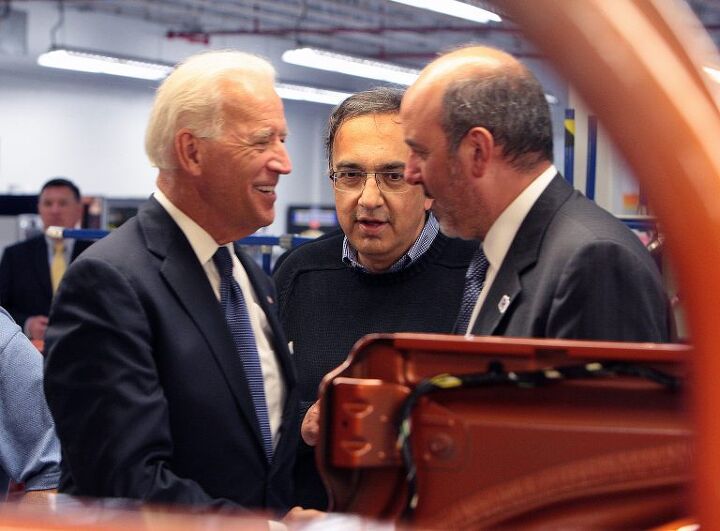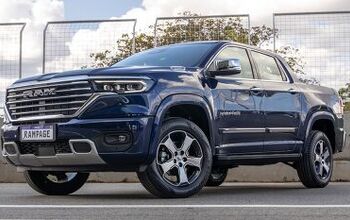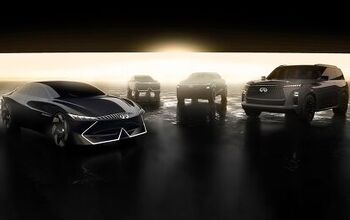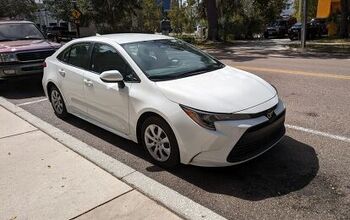That's Off-The-Record: Is Marchionne Trying to Pull the Wool (Sweater) Over Chrysler's Eyes?
About half a decade ago, FCA honcho Sergio Marchionne welcomed then-Vice President Joe “Lunch Bucket” Biden to the Jeep Toledo plant to celebrate all things Jeep. It was rather warm August day outside, but even hotter in the assembly plant where everybody’s favorite “uncle,” hair plugs and all, was decked out in a suit and tie. Marchionne, on the other hand, was “sporting” his signature blue wool sweater.
I was writing a politics blog for the Detroit News at the time, and I urged Mr. Marchionne to give his sweater shtick a rest. Why? Well, when the “Number Two” for the United States shows up in a suit, you look disrespectful in a sweater … even if it is from Nordstrom. Worse yet, I pointed out, it had to be hotter than hell in a wool sweater in an assembly plant humming with new vehicle production.
Up to that point, I was duly impressed with the Canadian-Italian and his rescue of my former employer. He was smart, funny and all-too-quotable. Most importantly, he had asked his Chrysler colleagues to work their butts off to save the company, and his minions quickly saw nobody worked harder than Sergio as he chain-smoked his magic on the often down-and-out company.
Marchionne did what former CEO Bob Nardelli couldn’t do in the former Home-Depot-throw-off’s two-year “Reign of Error.” Marchionne didn’t just lead the members of his team. He got in the trenches and inspired them.
Fast forward to late 2016 through today, and I’m asking myself: Is Marchionne a “loon” or a “boon” for FCA’s future?
Out-of-the-blue months ago, Marchionne was the lead cheerleader in the need for further consolidation of the global auto industry, and was seemingly driving around General Motors HQ in Detroit with a bullhorn announcing a potential tie-up with the Motown behemoth. In fact, he seemed more like a Girl Scout selling cookies (Samoans, love them) outside your local grocery store. It was as if he would not take “No” for an answer, although “No” was uttered loud, clear, and often from General Motors CEO Mary Barra.
This looney courting gave many of the folks inside FCA an uneasy feeling; that the company might be headed for the dirt farm — again. You must realize some long-timers who are still at the company-formerly-known-as-Chrysler have faced corporate bankruptcy four times in their careers. For many, it was like a scene out of Poltergeist: “They’re here!”
The consolidation pitch made a lot of media and analysts scratch their heads and, of course, it led to all kinds of dire speculation and nasty criticism of Marchionne’s methods in screaming from the mountain top.
Still, Marchionne isn’t the first CEO to very publicly call for a consolidation between two auto companies.
Kicking the tires
But back in 1999, good ol’ DaimlerChrysler was considering the purchase of bankrupt Nissan Motor Company. If fact, it forced Nissan to pull up its kimono and let it see everything regarding the state of the Japanese company. It wasn’t pretty. At the 11th hour, DaimlerChrysler pulled out of the deal and Nissan was left at the altar — pregnant and without hope.
As Obi Wan said to Yoda: “There is another.” That “another” was Carlos Ghosn and Renault. Renault had been hugely public in its desire to take control of Nissan should the Germans pull out prematurely. Ahem.
The rest is history.
Renault/Nissan went on to, as Borat would say, Great Success! DaimlerChrysler crumbled. The Germans, in less than a decade, lost faith in Chrysler and threw the Americans to the curb. After a bankruptcy, Chrysler was “given” to Fiat as part of the U.S. government bailout of Chrysler and GM. Enter Sergio and his infusion of blood, sweat, tears, smokes, and — contrary to popular belief — a lot of money to right the ship.
So, Marchionne may not be that looney in his desire for consolidation, after all. Or is he?
Let’s be friends
Marchionne’s talk of working with VW wasn’t necessary looney, but the timing was weird considering General Barra’s rebuff. If you’re keeping score regarding consolidation with GM or VW, Marchionne is not necessarily a “loon,” but he might be screwing with everyone.
Debt-free or bust?
As Marchionne put it succinctly, “We have gone a long way in the last ten years but the ability to effectively extinguish all of our debts is something which remains a key objective.”
Has he given up on that consolidation thingy?
“The better way to run this business is by consolidating forces, keeping a multi-brand environment that faces the customer and that effectively shares all the essential elements of design and manufacture of cars on a commissioned basis as much as is possible,” he recently said.
In almost the same sentence, Marchionne continues, “I’m pursuing nobody. I haven’t gone out to chase anybody.” Um, OK, whatever.
Some on Wall Street are getting back on the Marchionne bandwagon. Said analyst Max Warburton of Bernstein Research, “We are initiating coverage on FCA with a market-perform rating. FCA has made far greater progress than we anticipated a few years ago. We accept we need to eat another slice of humble pie given the achievements of 2016. But will we need to eat the whole pie — and even our hat — come 2018? Marchionne continues to insist he will deliver his financial target. Increasingly, the market seems to believe it’s going to happen — and perhaps we need to accept it too.”
Perhaps analyst George Galliers of Evercore ISI said it best: “Have we gone ‘mad’? To follow in the footsteps of FCA CEO Marchionne and reference Lewis Carroll, we don’t want to go among mad people, and we’re sure ‘the best people’ usually aren’t mad. However, the day has come to upgrade FCA from sell to buy.”
Jason Vines is a former automotive industry PR professional who’s worked for Chrysler (twice), Nissan, and Ford — during the Firestone tire crisis. He went on to work for Compuware in Detroit, before diving into the complex world of Bible publishing. He’s the author of “ What Did Jesus Drive?: Crisis PR in Cars, Computers, and Christianity” and co-author of “ The Last American CEO,” a behind-the-scenes account of Chrysler’s purchase of American Motors. He currently resides in North Carolina.
Latest Car Reviews
Read moreLatest Product Reviews
Read moreRecent Comments
- 28-Cars-Later I see velour and pleather seats are back in style.
- 28-Cars-Later Please come buy one of the two things we sell which don't suck.
- 28-Cars-Later Ahahahahaha.
- Carrera I live in Florida and owned summer tires once before on a Corolla. Yes I know, it's a Corolla but it drove much better ( to me) with those on. I would have bought them again but replacement time came during the beginning of the " transitory inflation" and by then, I found all seasons that were much cheaper. Currently I own a slightly more performance oriented Acura TLX -AWD and when the OEM all season Michelin wear out, I will replace them with summer Michelins. Often times, a car comes alive with summer tires but I understand why people don't buy them above South Carolina. I lived in Canada for 5 years and just thinking about swapping twice per year made me anxious.
- Steve Biro I don’t bother with dedicated summer or winter tires. I have no place to store them. But the newest all-weather tires (with the three-peak mountain symbol) are remarkably good year-round. The best of them offer 90 percent of the performance of winter tires and still fall mid-pack among summer ultra-high performance tires. That’s more than enough for my location in New Jersey.

































Comments
Join the conversation
Speculation on whether the sweater is brilliant or an idiot is a waste of time. In every survey of quality/reliability, virtually all of FCA's products are in last place. This isn't a new phenomenom. They've had ample time under various owners to fix this. As far as brand equity, Ram still has it, but Jeep is quickly losing it. Dodge, Chrysler, Fiat and Alfa Romeo are irrelevant.
I'm glad we're finally free of hair-insecurity in the executive branch...